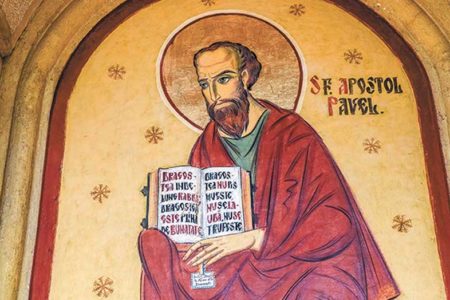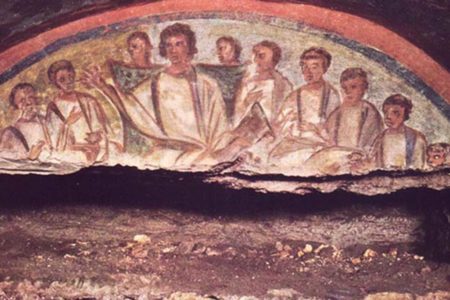The saying is true: there is no such thing as bad publicity. When the American writer Reza Aslan was subjected to an especially crass interview on Fox News recently, his book, Zealot: The Life and Times of Jesus of Nazareth, swiftly climbed to the top spot on the Amazon bestseller list, knocking J K Rowling out of the way in the process.
Aslan’s book is worth reading. He has an eye for a good story, a neat turn of phrase, and the ability to make technical scholarship readable – no mean feat. It is true that the book is smattered with errors, makes some sweeping and therefore less than accurate generalisations, and offers a portrayal of the historical Jesus that would not find support from most historians of the period, let alone most Christian believers.
He is right to suggest that the crucial question for understanding the life of the historical Jesus is: ‘Why was he crucified?’ But when it comes to the answer he is on less secure ground.
Aslan suggests that Jesus was a “revolutionary zealot who walked across Galilee gathering an army of disciples with the goal of establishing the Kingdom of God on earth”.
This is close, but not close enough.
The human, revolutionary, zealot Jesus is the hero of Aslan’s book. As he concludes: “Jesus the man…is every bit as compelling, charismatic, and praiseworthy as Jesus the Christ. He is, in short, someone worth believing in.” Aslan is no less clear about the identity of the villain: the apostle Paul.
The story Aslan tells is well-known and often repeated. Paul was not especially interested in the historical Jesus. He turns the real, human teacher from Nazareth into a divine Lord.
In Paul’s hands Jesus is deified, and so de-humanised and de-Judaised. Paul therefore invents Christianity as we have inherited it. And Christianity would do well to shake off the Pauline virus so that it can breathe in again the clean, pure air of Jesus’ revolutionary program, unaffected by the suffocating influence of christology, atonement or eschatology.
Throughout the last 18 months I have spent a good deal of time speaking in churches about Paul. I try not to make him into a hero.
Paul himself, despite an obvious confidence in his calling and message, called himself a slave of Christ; not the most heroic of job titles.
There are several features of Paul’s thought that are problematic, the product of a man thoroughly immersed in the cultural context of his own day.
But as I talk about his life and message, I continually insist that forms of Christian faith and discipleship that seek to side-step Paul on their way back to meeting the ‘real’ Jesus have misunderstood something important; something to which Paul devoted his life and his considerable intellect.
There are some obvious problems with the ‘leave Paul alone and go back to Jesus’ rallying cry.
Paul’s letters are our earliest extant texts from the burgeoning Jesus movement. The gospels were written at least two or three decades after Paul had left his indelible mark on that movement.
Each of them, in different ways, seems to be in critical dialogue with Paul (with Mark and Luke on the more positive and Matthew and perhaps John on the more critical side). New Testament scholars in increasing numbers are rejecting older theories that – some claim – help us to get behind Paul to an earlier form of Christian faith.
‘Q’* was always a hypothesis. I am one of those that has come to see it is very likely a mistaken one. The ‘Q’ source, the ‘Q’ gospel and the ‘Q’ community did not exist. The Gospel of Thomas can look like a gospel that comes from another more attractive theological world. But it is much more likely to be a development away from earlier traditions about Jesus including those we find in the canonical gospels.
When it comes to Paul’s letters themselves, we need to bear in mind that Paul learned the major themes of his gospel message (Jesus as the crucified Messiah, God’s raising of Jesus from the dead) from the first followers of Jesus.
Although his letters make little direct reference to Jesus’ teaching (though they refer to that teaching much more often than Aslan allows), the whole structure of his theology is a re-articulation of Jesus’ central message: that Israel’s God will come to deliver and save God’s people from her enemies and will inaugurate a new era.
Like all early Christ-believers after Easter Sunday, Paul believed that this act of God, that Jesus looked towards, had in fact now happened in the death and resurrection of Jesus himself. In contrast to some Christ believers, Paul also believed that God’s deliverance was universal, indeed cosmic, in scope. This is what leads him to take on the vocation of ‘apostle to the Gentiles’.
To be sure, there is a revolution here.
But the revolutionary potential does not only lie in the bare facts of what Jesus did and said, or how Jesus died. It also lies in the interpretation given to these events.
And here Paul joins with the rest of the early Jesus movement in saying that these words and deeds, this life and this death, can be seen—in the light of the resurrection—to be more than the story of a ‘radical Jewish nationalist who challenged the Roman occupation and lost’. In the words of Jules from the movie Pulp Fiction, ‘God got involved’.
As Paul says, ‘if anyone becomes a part of this Messiah’s people, the creation is remade. Everything old goes. And what comes is radically new’ (2 Cor. 5.17).
There isn’t anything more revolutionary than that.
*‘Q’ source is a hypothetical written collection of sayings based on the oral tradition of the early church.





